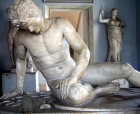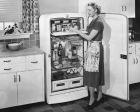Living Memory
Studying events within living memory can help young children to gain an early understanding of chronology and that history is made all of the time. It also helps them to understand the world and their place within it. Through this Key Stage 1 unit of study, children are introduced to historical concepts, vocabulary and representations through exploring the ways in which life has changed over the time of their parents, grandparents and great-grandparents. This can be used to reveal aspects of national events or changes where possible. Popular areas for this topic include family, toys, holidays, the climate, technology, school, among many others. In this section you will find articles and guidance to help you plan exciting and creative ways to introduce your children to the study of history.
-

50th anniversary of the UK’s first official Pride march: 1 July 2022
ArticleClick to view -

A history of the world - 100 objects that tell a story
ArticleClick to view -

Animals who help us: teaching past and present in EYFS
ArticleClick to view -

Anniversaries: The Coventry Blitz and the Grave of the Unknown Soldier
ArticleClick to view -

Anniversary: Festival of Britain 1951
ArticleClick to view -

Back to basics: using artefacts in the classroom
ArticleClick to view -

Belmont’s evacuee children: a local history project
ArticleClick to view -

Changes in an aspect of social history from 1945 to 2000: youth culture
ArticleClick to view -

Chronology: Developing a coherent knowledge
ArticleClick to view -

Creating drawings and environmental narratives for developing historical thinking
ArticleClick to view -

EYFS Medium Term Plan - Toys and Games
ArticleClick to view -

Exploring the history of our place with very young children
ArticleClick to view -

Fifty years ago we lost the need to know our twelve times tables
ArticleClick to view -

Food – a theme for learning about the past
ArticleClick to view -

Happy and Glorious: exploring and celebrating the Platinum Jubilee
ArticleClick to view -

Here comes the ‘60s
ArticleClick to view -

History through children’s voices
ArticleClick to view -

History...about lives and living
ArticleClick to view -

How to make a toy museum
ArticleClick to view -

Ideas for Assemblies: Refugee stories
ArticleClick to view

